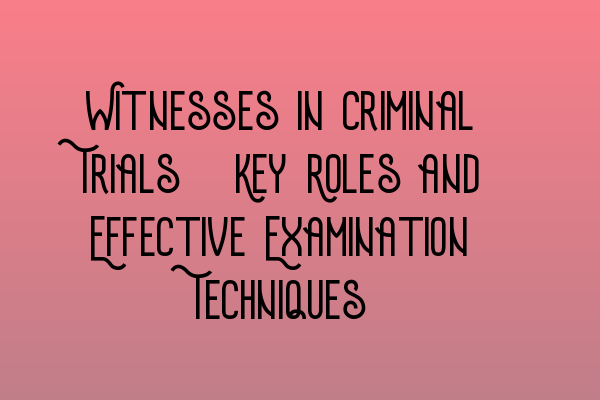Witnesses in Criminal Trials: Key Roles and Effective Examination Techniques
Welcome to SQE Criminal Law & Practice Law UK, where we provide comprehensive guidance and support for aspiring solicitors preparing for the Solicitors Qualifying Examination (SQE). In this comprehensive blog post, we will explore the key roles of witnesses in criminal trials and effective examination techniques to maximize the impact of their testimonies.
The Importance of Witnesses
Witnesses play a crucial role in criminal trials. Their testimonies help establish the facts of the case, provide the court with evidence, and aid in determining the guilt or innocence of the accused. As a solicitor, it is essential to understand the significance of witnesses and how to effectively examine them to present a strong case.
Roles of Witnesses
There are various types of witnesses who may be involved in a criminal trial. They include:
- Eye Witnesses: These individuals directly observe the crime or relevant events and can provide first-hand accounts.
- Expert Witnesses: Professionals with specialized knowledge or expertise relevant to the case. They can provide technical or scientific explanations to assist the court.
- Character Witnesses: Individuals who can vouch for the defendant’s character or credibility.
- Corroborative Witnesses: Witnesses who support the testimonies provided by other witnesses or provide additional evidence.
Each witness has a unique purpose, and it is the solicitor’s responsibility to effectively examine them to present a cohesive and compelling case.
Effective Examination Techniques
Examining witnesses requires careful planning and strategic implementation. Here are some key techniques to make the most of witness testimonies:
- Prepare Thoroughly: Familiarize yourself with the witness’s statement and evidence to ensure you ask relevant and impactful questions.
- Establish Rapport: Build a rapport with the witness to gain their trust and ensure they feel comfortable during the examination process.
- Use Open-Ended Questions: Ask questions that prompt detailed answers rather than simple ‘yes’ or ‘no’ responses. This allows the witness to provide a comprehensive account of events.
- Listen Actively: Pay close attention to the witness’s responses and adapt your questioning accordingly. This demonstrates respect and helps uncover additional relevant details.
- Control Emotions: Maintain a calm and professional demeanor to prevent witnesses from becoming defensive or agitated.
- Avoid Leading Questions: Leading questions may suggest answers or prompt the witness to agree with the solicitor’s assumptions. Instead, focus on eliciting unbiased information.
- Seek Clarity: If the witness’s testimony is unclear or inconsistent, politely seek clarification to ensure accurate understanding.
- Consider Cross-Examination: Anticipate potential weaknesses in the witness’s testimony to effectively cross-examine and highlight any inconsistencies or contradictions.
By employing these effective examination techniques, solicitors can strengthen witness testimonies and present a solid case to the court.
Conclusion
Witnesses are vital components of criminal trials, providing invaluable information and evidence to influence the outcome. As a solicitor, mastering the art of examining witnesses is crucial for constructing a persuasive case. By preparing thoroughly, establishing rapport, and using effective questioning techniques, solicitors can maximize the impact of witness testimonies.
For more information on SQE preparation, including MCQ practice exams, practice mocks, and preparation courses, please visit the following links:
- SQE 1 Practice Exam Questions
- SQE 1 Practice Mocks FLK1 FLK2
- SQE 2 Preparation Courses
- SQE 1 Preparation Courses
- SRA SQE Exam Dates
